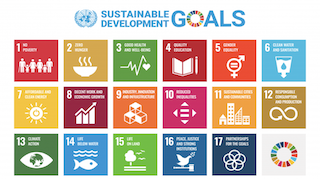In September 2015, every UN member country endorsed the 2030 Agenda for Sustainable Development, which comprises 17 target areas known as the Sustainable Development Goals (SDGs).
 After falling from 10.1 percent in 2015 to 8.6 percent in 2018, the global poverty rate increased to 9.2 percent in 2020 because of the COVID-19 pandemic, reversing a long trend of poverty reduction. Other headwinds such as armed conflicts, rising inflation, food insecurity, and political and social unrest also are affecting global development, and the UN estimates that these crises combined to cause an additional 95 million people to live in extreme poverty in 2022.
After falling from 10.1 percent in 2015 to 8.6 percent in 2018, the global poverty rate increased to 9.2 percent in 2020 because of the COVID-19 pandemic, reversing a long trend of poverty reduction. Other headwinds such as armed conflicts, rising inflation, food insecurity, and political and social unrest also are affecting global development, and the UN estimates that these crises combined to cause an additional 95 million people to live in extreme poverty in 2022.
On the other hand, the digital revolution has made many people’s lives easier with access to mobile phones, the internet and other tools. Digital financial inclusion (DFI) and its innovative business models have had a particularly disruptive effect, bolstering financial inclusion worldwide.
Impact on Sustainable Development Goals
DFI is enabling all types of pathways to advance the achievement of the SDGs, strengthening the link between financial inclusion and development. In 2016, CGAP and

 Kashf Foundation, a provider of microloans and microinsurance to women in Pakistan, recently secured a local-currency loan of undisclosed size from SEB Microfinance Funds, an offering of
Kashf Foundation, a provider of microloans and microinsurance to women in Pakistan, recently secured a local-currency loan of undisclosed size from SEB Microfinance Funds, an offering of  This event offers a one-day summit on March 14 and a two-day workshop on March 15 and 16, all with the aim of promoting Islamic finance in the 10 member countries of the Commonwealth of Independent States (CIS). The summit offers sessions titled Islamic Finance and Financial Inclusion; Investment
This event offers a one-day summit on March 14 and a two-day workshop on March 15 and 16, all with the aim of promoting Islamic finance in the 10 member countries of the Commonwealth of Independent States (CIS). The summit offers sessions titled Islamic Finance and Financial Inclusion; Investment